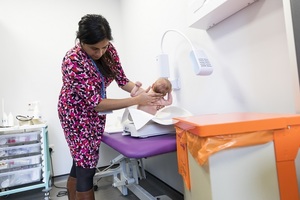NHS pensions for senior clinicians: new changes announced to improve care
The Department of Health and Social Care will open a new public consultation proposing full flexibility over the amount senior clinicians put into their pension pots.

The government wants to change pension rules for top doctors, surgeons and other high-earning clinicians to allow them to take on extra shifts and treat more patients without losing out financially.
The Department of Health and Social Care (DHSC) will shortly open a new consultation asking people what they think about the set of proposals, which includes giving senior clinicians full flexibility over the amount they put into their pension pots.
This replaces the 50:50 proposal put forward for consultation in July.
Starting from next financial year, the new rules would allow senior clinicians to set the exact level of pension accrual at the start of each year.
For example 30% contributions for a 30% accrual rate, or any other percentage in 10% increments depending on their financial situation. This would give them room to take on additional work without breaching their annual allowance and facing tax charges.
Employers would then have the option to recycle their unused contribution back into the clinician’s salary.
The proposals follow the commitment made in the NHS People Plan to deliver a fairer and more flexible approach to the NHS Pension Scheme for senior clinicians.
Guidance will also be given to employers setting out how they can provide flexibility at a local level this financial year for clinicians to do extra work without breaching limits for pensions tax relief.
This will allow affected staff to opt-out of the NHS pensions scheme mid-year. Their employer will be able to use discretionary flexibility to maintain the value of the clinicians’ total reward packages.
The NHS Pension Scheme is recognised as one of the most generous in both the private and public sector. But the tapered annual allowance means some clinicians can face tax charges. Around a third of NHS consultants and GP practice partners have earnings from the NHS that could potentially lead to them being affected by the tapered annual allowance.
Alongside the proposals for full flexibility, HM Treasury will review how the tapered annual allowance supports the delivery of public services such as the NHS. HM Treasury will continue to engage with the NHS, the British Medical Association (BMA) and other stakeholders as part of this process.
Chancellor of the Exchequer, Sajid Javid, said:
This government is committed to ensuring that British people see a real difference in public services, including getting quicker GP appointments and a reduction in waiting times.
Critical to that is introducing flexibility into the system so that our hospitals have the staff they need to deliver high-quality patient care, which is why we’ve listened to concerns and will be reviewing the operation of the tapered annual allowance. This will help to support the delivery of our vital public services.
Health and Social Care Secretary, Matt Hancock, said:
NHS doctors do extraordinary, life-saving work every day, and they should not have to worry about the tax impacts if they choose to go the extra mile by taking on additional work to help patients.
These comprehensive proposals will give doctors the pension flexibilities they have called for and need to make sure they are rewarded for extra work. We are taking immediate action and I hope these flexibilities will encourage our top NHS staff to fulfil the dedication of their mission: to care for their fellow citizens in time of need.
Updates to this page
-
Added information about guidance that will be issued to NHS employers to give clinicians more flexibility this financial year.
-
First published.